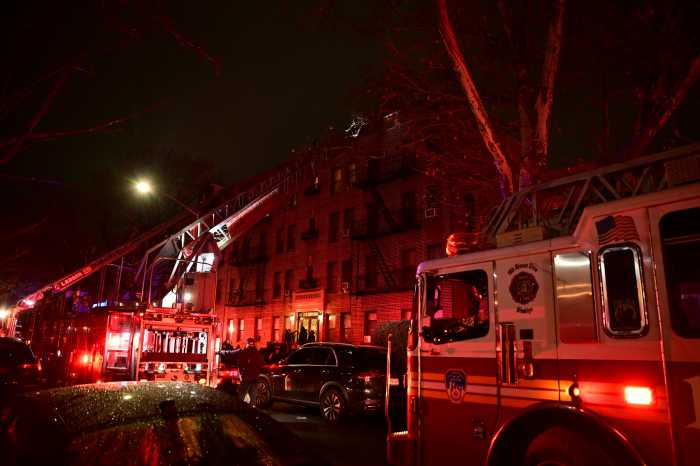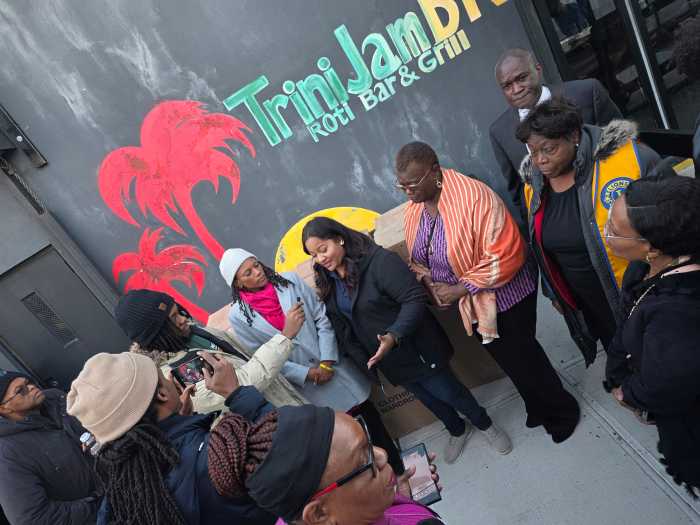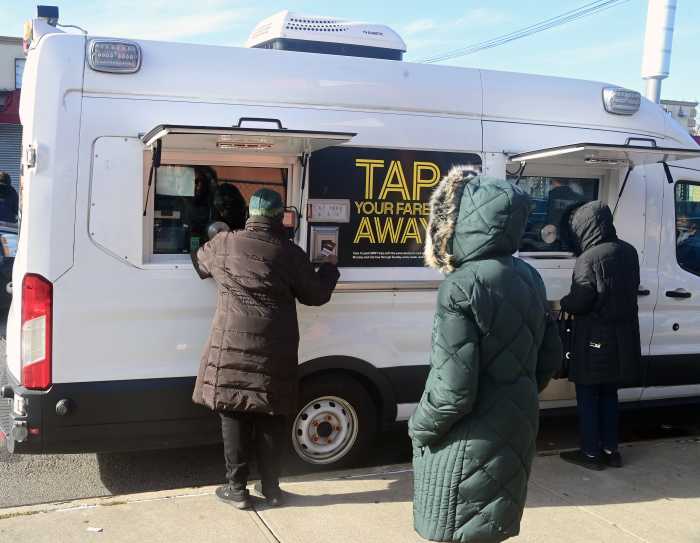SAGE members’ old couch cut up and left in the trash outside the LGBT Community Center. | CAROL DEMECH
A month ago, older LGBT people who have met at the SAGE Room at the LGBT Community Center for more than 30 years celebrated what they saw as a victory. After having already been moved from their longtime home on the ground floor due to renovations at the Center, they believed that had won the right to control their use of room 207.
But within days of SAGE’s executive director, Michael Adams, meeting with the group’s constituents who gather on West 13th Street and saying they were “happy” with an agreement worked out with the Center, several of the seniors were telling Gay City News they do not have control over the space and want it.
The SAGE constituents were especially alarmed when they saw the couch from their old room cut up in the Center’s trash. They also say that outside activities were scheduled in their room on Thursday and Friday nights without consulting them, displacing the SAGE Singers rehearsal and a men’s discussion group.
Members say loss of control key complaint
SAGE has since sent Tom Weber, its director of care management services, to meet with those constituents raising concerns, and Peter Hess, one of the older gay men, said he found the tone of the meeting “cordial.” Hess added, “But the problem is that both the Center and SAGE have decided to ignore what we want and do what they want.”
SAGE and Center leaders deny this, but only up to a point.
Rob Wheeler, the Center’s chief operating officer, wrote in an email, “The Center’s agreement is with SAGE, not individual members. This includes furnishings and other items in the room. The Center and SAGE have come to an agreement about how the space is being used going forward, which is open to change or adjustment if SAGE desires. Part of that agreement was that worn-out furniture would be replaced with new furniture. If SAGE members have concerns, they need to speak with SAGE as they have been doing.”
Tracy Welsh, SAGE’s deputy director, told Gay City News, “We want our constituents to be happy there. It is a leased space for all older adults who want to use it. The whole result shows that constituents have had a lot of input. What constituents want is very important.” She added, “We did say the old furniture would not go back in and that it could be thrown out.” Constituents will have “a say” on the selection of new furniture, Welsh explained, saying it would be “homey” but has to be “accessible and age-appropriate.”
Carol Demech, a constituent, said that the furniture, which also included tables, brass lamps, a TV, a new refrigerator, a computer, and artwork and photos done by the people who use the room, was owned by them and that nothing should have been disposed of without their consent. “The furnishings were donated to SAGE seniors by other SAGE seniors,” she wrote in an email. “SAGE will not talk to us. We send them emails and they are not answered.”
Other constituents, however, said their emails to SAGE have been answered.
Jerry Hoose, a Gay Liberation Front veteran from the late 1960s who is one of the leaders of the effort to keep control of the room, said, “We’re getting crapped on slowly. We’re going to get kicked out on our asses. SAGE is not fighting to keep our presence here [at the Center]. They have broken our agreement.”
Bill Shubick, a constituent who directs the SAGE Singers, said of his group’s displacement from meeting at their usual time on Thursday nights, “SAGE offered me my time slot back, but they want me out by 6:30 p.m. sharp,” which would eliminate the group’s customary half-hour of socializing after rehearsal. “That’s unacceptable,” Shubick added. “We’re being squeezed. We want control back.”
The Friday evening men’s discussion group, meanwhile, has been moved to the SAGE Center at 305 Seventh Avenue at 28th Street, an arrangement that Hess, one of its members, said the group is trying to reverse.
Phil Katz, another constituent, said, “I love SAGE, but the staff members don’t communicate with one another and therefore miscommunicate with the constituents. It’s very frustrating.” He worries that more time slots will be taken away from the seniors.
Saying, “I feel we’re being flimflammed with information constantly changing,” Alvin Goldstein, 74, explained why the issue is so important to longtime members of the group that meets at the Center. “This is the only venue where [older] gay men and women can come in and feel free to be themselves,” he said. “We can’t do that at a regular senior center. And the SAGE Center doesn’t have the space to have a socialization area. They have a small room, but it can’t handle all of us.”
SAGE’s Welsh pointed out the benefits of the group’s new space in room 207. “From our perspective, this is a bright new space that will have new furniture,” she said. “It will have a refrigerator. The hours will be pretty much the same, with access on Sundays.”
The Center’s Wheeler acknowledged the concerns of the SAGE members but noted they need to get on the same page as that group’s leadership. “All of us at the Center have a deep respect for SAGE and its members, and we look forward to many more years of SAGE at the Center,” he wrote in an email. “As with any group that rents space, it is not our place to get into the middle of a group’s leadership and its members. The Center has said Ôyes’ to every request SAGE has made regarding the SAGE community room, and we continue to be open to whatever they might need from us in the future.”
The SAGE constituents, meanwhile, are circulating a petition voicing their concerns that they will present to the both SAGE and the Center.


















